All about dehydration
You know drinking enough water is vital for your body to stay hydrated. Typically, men should drink at least 101 ounces of water a day and women should drink about 74 ounces, this is about 13 cups and nine cups, respectively, according to the Institute of Medicine. However, your recommended water intake is based on several factors, including sex, age, and activity level.
But the truth is, it can be easy to forget to drink water throughout the day. You have a coffee or tea in the morning, a juice or a soda in the afternoon, and perhaps you pair a glass of wine with dinner in the evening. Yet, you still feel dehydrated. Why? Some beverages, like wine, can have dehydrating effects on the body, leaving you more thirsty than when you started.
Therefore, drinking water and having enough fluids in your body is essential to your health. But aside from thirst, how do you know if you need to increase your fluid intake?
Our health experts help us take a closer look at the telltale signs to look for when you need to drink more water.
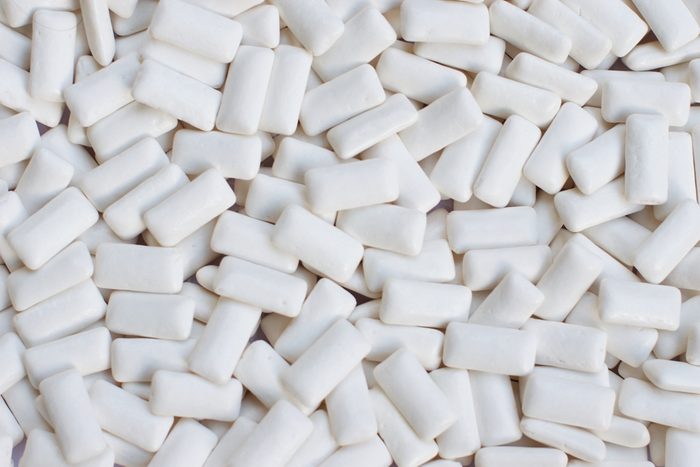
You have stinky breath
Saliva works 24/7 to wash away food particles that collect on your tongue, between your teeth, and along your gums after you eat. If your mouth is dry, those itty bitty leftovers allow bacteria to grow, thrive, and give you bad breath, one of the signs of dehydration. Sip water throughout the day to help keep your mouth moist. And if you need a little extra freshening: Chewing gum (preferably sugarless) or sucking candy (also sugarless) helps stimulate saliva. Here are some tips for staying hydrated throughout the day.

You’re cranky
If you’ve ever noticed you’re in a bad mood while dehydrated, it may be more than just a coincidence. A study published in The Journal of Nutrition found in a group of healthy women, they were more likely to report fatigue, irritability, headaches, and difficulty focusing after feeling dehydrated. This occured after they were asked to drink a healthy amount of water one day and then reduce their water intake over the next two days. Moreover, in a separate test, the researchers found men with mild dehydration also had fatigue and trouble with mental tasks. However, when it came to mood changes, women were more likely in a bad mood than men. It’s unclear as to why. (Here’s what you should know about the link between dehydration and anxiety.)
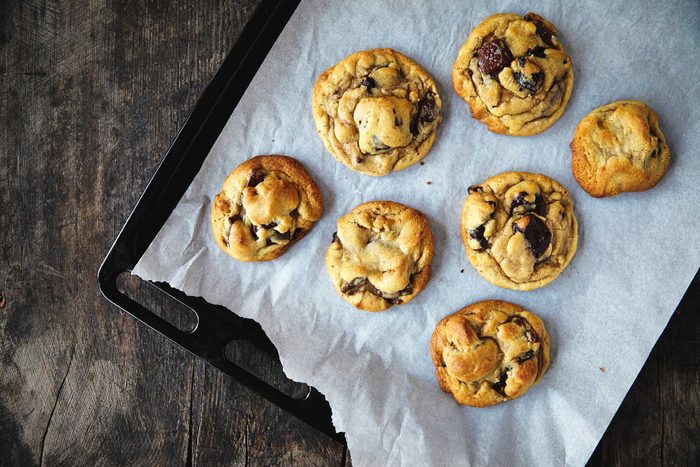
You crave cookies
You might mistake needing to drink for wanting to nosh, especially after exercise. “After a strenuous session, we are not only dehydrated, but our glycogen stores are depleted,” says Kim Larson, RDN, sports dietitian and spokesperson for the Academy of Nutrition and Dietetics. Glycogen is a form of stored carbohydrates that our body uses as fuel; the cravings are just our bodies telling us we need more of it and is one of the signs of dehydration. “Not everyone wants sugar after exercising, but when you are tired, it’s tempting to reach for it!” says Larson. Better choices: Fruits and dairy foods deliver the quickest, most nutrient-rich carbohydrates to supply energy when glycogen stores are low; plus, many fruits and yogurt have a high water content to also help you rehydrate. You don’t have to worry about dehydration symptoms once you do start drinking enough water. (Don’t miss the surprising benefits of lime water for your health.)
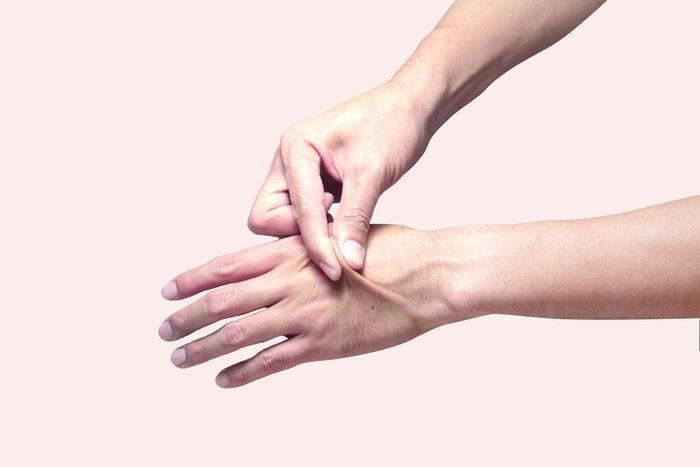
Your skin does this weird “tent-ing” thing
Pinch the back of your hand and hold for a few seconds; when you let go, your skin should snap back into position pretty quickly. If it’s slow to return to normal, take that as one of the signs of dehydration. “Skin turgor—a measure of skin elasticity—begins to decrease with a fluid loss of about 5 percent, which is considered mild dehydration,” explains Chris G. Adigun, MD, a board-certified dermatologist in Chapel Hill, North Carolina. With more moderate or severe dehydration, the pinched-up skin will remain “tented” in place. Why else should you stay hydrated? To help you look younger. “Especially as we age, the visible appearance of the skin of the face improves with superb hydration,” adds Adigun. If you need even more motivation to stay hydrated, check out these health benefits of drinking enough water during the day.
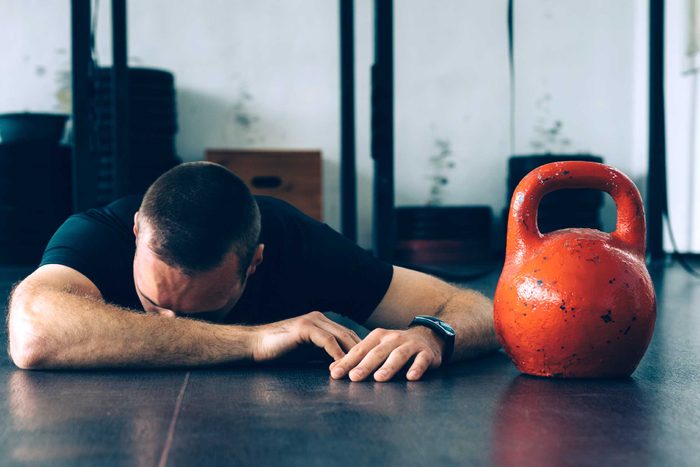
You have a crappy workout
Dehydration can reduce blood pressure and makes the heart work harder, which impacts how much you can push yourself, explains Larson. “Even a 2 to 3 percent fluid loss affects your ability to get a good workout,” she says; “and more than 5 percent dehydration decreases exercise capacity by about 30 percent.” A no-brainer way to avoid dehydration and dehydration symptoms is to aim for this much water per day.
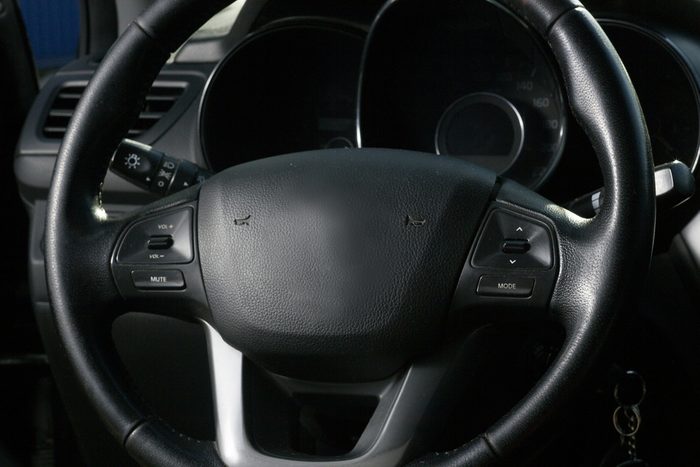
You drive like you’re drunk
You pee before you hit the road and barely sip your bottle of water en route, all in the name of avoiding pit stops. We get it. But according to a 2015 study published in Physiology and Behavior, driving while dehydrated may be just as dangerous as getting behind the wheel intoxicated, in terms of how many mistakes you could make on the road. British researchers had study participants take two-hour drives (using a simulator): when they were well-hydrated, there were 47 driving errors; dehydrated, slips-up—including lane drifting and late braking—more than doubled to 101. Dehydration causes fatigue and affects our cognitive abilities, like clear thinking and reaction time, says Larson. (Learn how drinking enough water changes your body.)
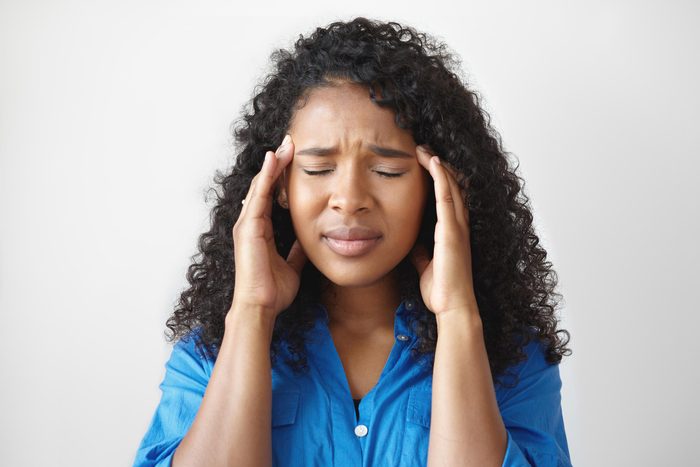
You feel woozy when you stand too fast
One of the signs of dehydration is when your blood volume and pressure drop, according to the American Heart Association. This can leave you feeling dizzy or faint, or bring on that rush of light-headedness after you quickly get up from sitting or lying down. Feeling parched all day? These are the 8 unexpected reasons you’re always thirsty.
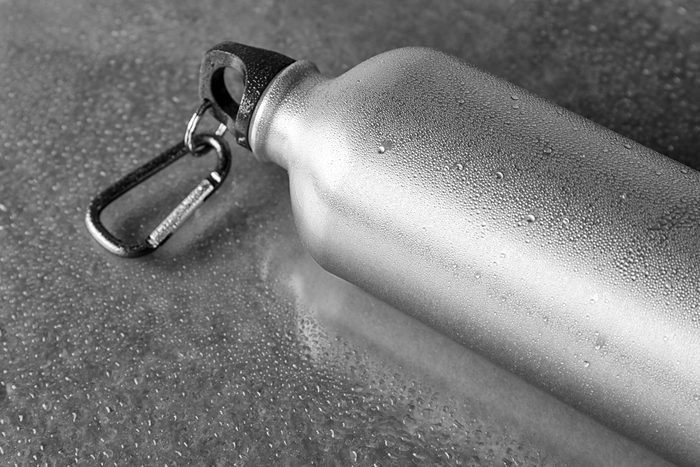
How do you treat dehydration?
To reduce dehydration, you have to replace lost fluids and electrolytes. The exact treatment for dehydration symptoms depends on several factors, like age and severity, according to the National Institutes of Health. In extreme cases, people might go to the hospital for an IV of salts and fluids. In kids, an over-the-counter fluid replacement drink may be needed in certain circumstances, but both adults and kids can offset dehydration by drinking lots of water. Just make sure you’re not refilling a plastic water bottle—ever.
